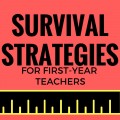Classroom Management: A Teacher’s Health

Teaching, unlike most professions, has very little downtime. Through their eight hour shift, they are primarily in front of their audience, i.e., students, the entire time. In comparison, another profession that covers information for an audience is a television journalist (I am referring to the profession of researching, writing, and reporting-not the profession of just reading teleprompter scripts someone else has prepared), but instead of being broadcast on the television for their entire shift, they are usually being broadcast for only about 30 minutes. For the remaining seven and a half hours of their workday, they are making their preparations. In comparison, for teachers, these preparations are worked on outside of their eight hour shift-that is, on nights, weekends, and holidays. It’s during these times that teachers are developing curriculum, creating instruction, and grading student work. While they are physically with their students, similar to a newscaster being “on camera,” they are expected to be delivering information, guiding students’ work, and managing student behavior. Students are constantly needing the teacher’s attention, and constantly watching what the teacher is doing.
More Than an Exercise Routine
Being continually in front of the audience and having to work well beyond the typical 40 hour work week, can take a huge toll on a teacher’s health if he is not in training for this type of regime. A daily exercise routine is a must. Many teachers exercise before or after the workday either at a local gym or outside-whichever the case may be-the most important consideration is to make it a daily habit and be flexible in regards to what time of day for the workout. Make it your goal to simply workout each day. Health professionals have touted the many physical and emotional health benefits of making an exercise program as part of a daily habit, but the most important benefit to a teacher’s health is his spiritual relationship with God (Eph. 3:17). Talking to God through your inner voice during your work out can be an extremely rewarding time spent with God each day, but you have to unplug from headphones in order to have a conversation with him. You will not audibly hear God’s voice outside of your mind, but just as you think to talk, God will give you thoughts that you will hear as your inner speaking voice (John 10:27). How do you know that you are hearing from God and not just making something up on your own? There are many ways to tell when God has given you a thought or idea. It will be something that you hadn’t thought of before, and when it comes to your mind, you will experience a feeling of excitement over the truth and rightness of the idea (Ps. 119:105). Do not to stop there, but later open the bible and ask God to show you passages that relate back to his idea or solution for you (Prov. 2:6). It’s best to do this for several days. If God keeps bringing the same answer back to you over and over, and he has shown you relevant bible passages, then it’s time to implement what he has told you to do into your teaching or with your students. Share with him all of the problems that you are facing in your teaching and ask him for his guidance (James 1:5). Talk to him about specific students that you need help with, co-workers that you need his counsel with, and curriculum areas to develop and teach. Allow God to guide every part of your teaching, and not only will you experience his success in your teaching; you will also experience his physical, emotional, and spiritual health (Phil. 4:19).
Problems with Eating
Most people don’t realize that eating can be a problem for many teachers. Unlike most professions in which workers are not constantly in front of an audience, when they feel hungry, they can just pull out some food and snack. Teachers, on the other hand, usually are not allowed to eat while they are teaching, and they’re teaching all day. Even when teachers are “on a lunch break,” they are either directly supervising students or if they’re allowed time away from their students, they still remain the primary person responsible for them. What this means is that if something happens to any of their students while they are away during lunch break, the teacher is responsible for taking care of the situation. In addition, many times parents take advantage of this “lunch break” to talk to the teacher, either on the phone or in person. If a teacher is allowed to be away from his students for a lunch break, at the most, he might have about 10-15 minutes to eat, this is minus the time it takes to get his students to the lunch room and go to the bathroom, because teachers are not usually allowed to go to the bathroom when they’re with their students. Then there is the amount of time taken in actually getting the lunch from the cafeteria. What ultimately happens then, with the remaining 10-15 minutes of lunch, is the teacher gulps down some food as fast as possible. This time could also be less if the teacher needs to get some component of instruction ready in the classroom before his students return. Days can go by in which the teacher doesn’t get a chance to eat anything during his full eight hour shift. This can leave him starving by the end of the day, and when he finally gets home, overeating all at once. This can foster very poor eating habits, leading to unwanted weight gain and poor health. Fortunately, there are some things that can be done to avoid ending up starving at the end of every teaching day.
Teachers can eat a snack when their students are eating also. Teachers can allow their students a snack time each day when they can munch on healthy snacks brought from home. The teacher, as well, can eat a healthy snack during this common eating time with each other. The teacher can also have healthy snack food available for a quick bite just before students arrive into the classroom, and again immediately after they leave. For lunch, the teacher can make sure to bring his own lunch with foods that are both high in nutrition and can be eaten quickly, for example, raw fruit and vegetables and sandwiches. And, if the teacher doesn’t have time to eat during lunch, these foods can be taken back to the classroom and eaten during a common snack time. Using these eating and food preparation methods insures that the teacher avoids becoming overly hungry, which can frequently lead to health problems related to overeating.
Thought Life at Bedtime
Another area of health concern that is very important for teachers is to get enough deep, rejuvenating sleep, each night. Because, unlike most jobs where employees can “be tired” during the workday shift and still function adequately, teachers will suffer repercussions from their students if they are perceived as being “tired.” Think of a television news anchor perceived as trying to stay awake while he’s reporting the news for the day. He wouldn’t come off very well to the viewers. Television journalists are expected to be demonstrating passion, excitement, and high levels of enthusiasm and energy while they are on camera; however, they don’t have to maintain this for a very long duration. Teachers, though, have to maintain this high level of enthusiasm for their entire eight hour shift. Maintaining such an unnatural high level of energy for such a long time span can be extremely exhausting, so it’s imperative for teachers to get plenty of rejuvenating sleep. However, many teachers struggle in getting the sleep they need.
There are many online articles about how to get a good night’s sleep, but what isn’t usually covered is the struggle in our minds at this time of night. Since teachers have very little alone time during the school day, they don’t have time to think through everything that happened. And since they are with a large number of people, including their students, sometimes students’ family members, and co-workers; an unusually high number of complicated interpersonal interactions occur without the adequate time to think about them. Reflections about these interactions can suddenly come rushing in when you are finally trying to relax and go to bed. It is crucial to understand that you have control over your thought life; you choose what to think about and what not to think about. If allowed, these thoughts can become so overwhelming that you could suffer panic attacks, which will destroy any chance of you getting the peaceful night’s sleep that you so desperately need. Make it a practice to not allow problem-laced thoughts into your mind during bedtime. If you have trouble stopping these thoughts, ask God to help you and trust that he will remove them (Is. 26:3-4). Ask God to give you a peaceful, restful, and protected night’s sleep (Prov. 3:24). Ask him to show you bible verses to read that will bring you comfort and security, and as you fall asleep, keep talking to him (Ps. 121:7). If you awaken during the night with any feelings or thoughts of worry, ask God to calm you, protect you, and keep you safe (James 1:6). This only works if you actually believe he will do this for you (James 1:6). It is best to process problems and interpersonal relationships with God during talks with him during the day, such as during an early morning prayer time with God, or during your exercise time. These are the best times when you can think clearly about the problems and listen to God’s solutions (Ps. 73:24).
When You’re Sick
Unlike many professions, it’s very complicated for a teacher to take a sick day off of work. In order to do so, he has to have his entire day’s lesson plans premade for a substitute to follow. Substitutes are not typically expected to do any planning, only to do what the teacher has laid out. Nor are substitutes expected to do any grading. So when the teacher returns, he has a lot of piled up work to do. Plus dealing with all the interpersonal issues that arose between the substitute teacher and the students, and there are usually plenty. In short, teachers cannot really afford to get sick, but if you do, your first response should be to seek God’s healing power to make you well again (Jer. 17:14). Ask God to heal your every sickness, every pain, and every injury that comes over you, and believe that he will (Matt. 12:21). During your talks with God, he might give you the thought to go to a doctor. Just as God gives teachers abilities to understand, care for, and instruct students, so too, he has given doctors and other health professionals special abilities to understand, care for, and instruct sick and injured people (1 Cor. 12:9). However, never stop asking God to heal you along with the doctor’s care (Rom. 12:12). Maintaining physical, emotional, and spiritual health is vital to success in the profession of teaching; and steadfast, engaged communication between you and God, is the key to staying healthy (1 thes. 5:17).
References
International Bible Society (1984). The Holy Bible, New International Version. Grand Rapids, MI: Zondervan Publishing House.
Acknowledgments
To date, I have been teaching for almost 30 years, and during this time, I have been medically diagnosed with a heart disease, two different types of cancers, and an eye disease, of which, God has healed them all. My youngest son suffered continually with several diseases during his early life, so much so, that he was almost perpetually on medications and being seen at the doctor’s about every two weeks. After years of intense prayer, my son has experienced complete healing in every one of the diseases, and rarely misses a day of school. I am continually grateful to God for the healing work that he has done in me and my family.
I would like to thank Dr. Charles F. Stanley for his inspirational messages that I have listened to, read, and studied for almost 20 years. Even though we have never met, his work for God has greatly influenced all areas of my life.








